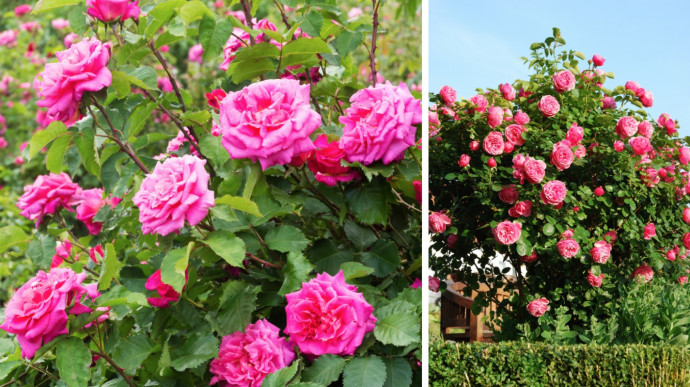1. Why don't rosebushes grow after giving them the best of care?

There is often a great difference between what roses like and what human beings think is good for them. As many plants are killed by improper care as by neglect. It is necessary to understand their basic requirements and then to provide for them. No treatment should be given unless there is a reason. Much is to be gained by letting well enough alone where the plants are making satisfactory growth.
2. Why do my roses fail to bloom even though they make some growth?

There are many possible reasons: shoots produced by the understock, incorrect pruning, insect infestation—especially rose midge—severe winter killing, too many flowers picked, and presence of diseases are a few.
3. What makes rosebushes gradually die out?

Poor location, poor drainage, diseases, winter injury, too much lime, too much fertilizer, not enough moisture, too severe pruning.
4. Why is it many of our roses have no fine feeding roots?

Often the feeding roots are so fine that they are lost when the plant is dug. Certain understocks do not tend to produce many fine roots.
5. How long after spring planting before fibrous roots will develop?

In properly prepared soil they will start in about 1 week. If the soil is too sweet or alkaline, contains too much fertilizer, or is too dry, the fine roots will not develop for some time.
6. Should rosebushes be taken up and the roots treated?

There is nothing to be gained by such a practice under ordinary circumstances, and many of the plants may fail to recover from such a treatment.
7. Will competition from tree roots prevent roses from flourishing?

Roses will not stand such competition. The beds should be located far enough from trees or other large plants to prevent the roots from entering the bed and exhausting the moisture and nutrients of the soil.
8. How can tree roots be kept out of rose beds?

About the only way is to put a concrete or metal barrier between the tree and the bed. Such a barrier should extend about 3 ft. down into the ground.
9. Why should our climbing rose fail to bloom?

Some varieties are naturally shy bloomers. If the canes are killed back to the ground level each year there will be no bloom. The variety may have reverted to the understock. Improper pruning will discourage flowering. It may be in too shady a location.
10. Is the fact that my climbing roses fail to grow due to the soil?

Most likely not. Lack of success with climbing roses is usually due to some factor other than the soil. Poor drainage, unfavorable location, disease and insect pests, improper winter protection, etc., are more common causes of failure.
11. What is the trouble with a climbing rose that never gets taller than 5 ft.?

The variety may not be a true climber. Perhaps more careful winter protection would prevent losing part of the canes from freezing.
12. What can be done to keep hybrid tea roses blooming and their foliage perfect, and not inclined to drop from the branches during hot weather?

Many of the Pernetiana roses have the inherent habit of dropping their foliage in summer, and no cultural treatment will stop it. Black spot will defoliate roses, some varieties being more susceptible than others. It will not be easy to keep hybrid teas in full bloom in summer heat. Feeding, watering, removal of spent flowers, and a regular weekly all-purpose spray or dust program from the time the leaves develop until frost, will retain vitality and assure a good display during late summer.














should I cut a rose bush down?